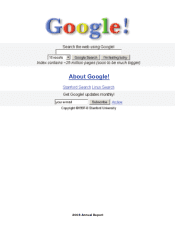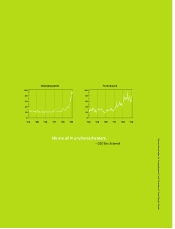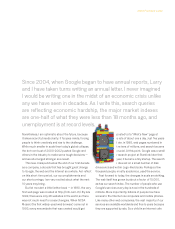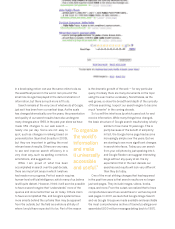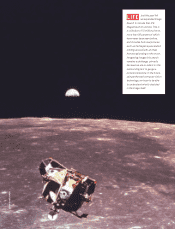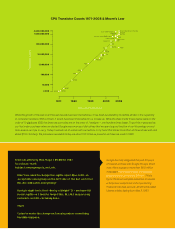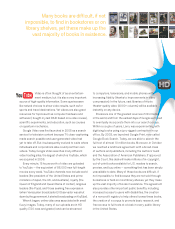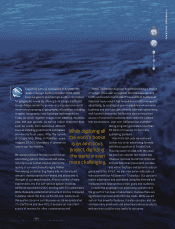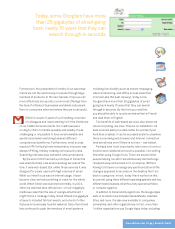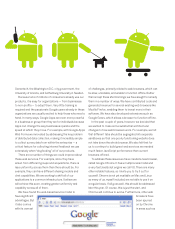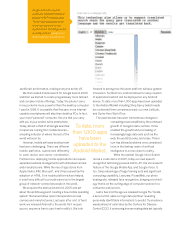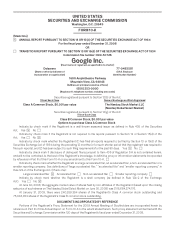Google 2008 Annual Report Download - page 4
Download and view the complete annual report
Please find page 4 of the 2008 Google annual report below. You can navigate through the pages in the report by either clicking on the pages listed below, or by using the keyword search tool below to find specific information within the annual report.
in a developing nation can use the same online tools as
the wealthiest person in the world. I am proud of the
small role Google has played in the democratization of
information, but there is much more left to do.
Search remains at the very core of what we do at Google,
just as it has been from our earliest days. As the scale
has changed dramatically over the years, the presentation
and quality of our search results have also undergone
many changes since 1998. In the past year alone we have
made 359 changes to our web search —
nearly one per day. Some are not easy to
spot, such as changes in ranking based on
personalization (launched broadly in 2005),
but they are important in getting the most
relevant search results. Others are very easy
to see and improve search e ciency in a
very clear way, such as spelling correction,
annotations, and suggestions.
While I am proud of what has been
accomplished in search over the past decade,
there are important areas in which I wish we
had made more progress. Perfect search requires
human-level artifi cial intelligence, which many of us believe
is still quite distant. However, I think it will soon be possible
to have a search engine that “understands” more of the
queries and documents than we do today. Others claim
to have accomplished this, and Google’s systems have
more smarts behind the curtains than may be apparent
from the outside, but the fi eld as a whole is still shy of
where I would have expected it to be. Part of the reason
is the dramatic growth of the web — for any particular
query, it is likely there are many documents on the topic
using the exact same vocabulary. Nonetheless, as the
web grows, so does the breadth and depth of the curiosity
of those searching. I expect our search engine to become
much “smarter” in the coming decade.
So too will the interfaces by which users look for and
receive information. While many things have changed,
the basic structure of Google search results today is fairly
similar to how it was 10 years ago. This is
partly because of the benefi t of simplicity;
in fact, the Google home page has become
increasingly simple over the years. But we
are starting to see more signifi cant changes
in search interfaces. Today you can search
from your cell phone by just speaking into it,
and Google Reader can suggest interesting
blogs without any query at all. It is my
expectation that in the next decade our
searches and results will look very di erent
than they do today.
One of the most striking changes that has happened
in the past few years is that search results are no longer
just web pages. They include images, videos, books,
maps, and more. From the outset, we realized that to have
comprehensive search we would have to venture beyond
web pages. In 2001, we launched Google Image Search
and via Google Groups we made available and searchable
the most comprehensive archive of Usenet postings ever
assembled (800 million messages dating back to 1981).
“ To organize
the world’s
information
and make
it universally
accessible
and useful.”

